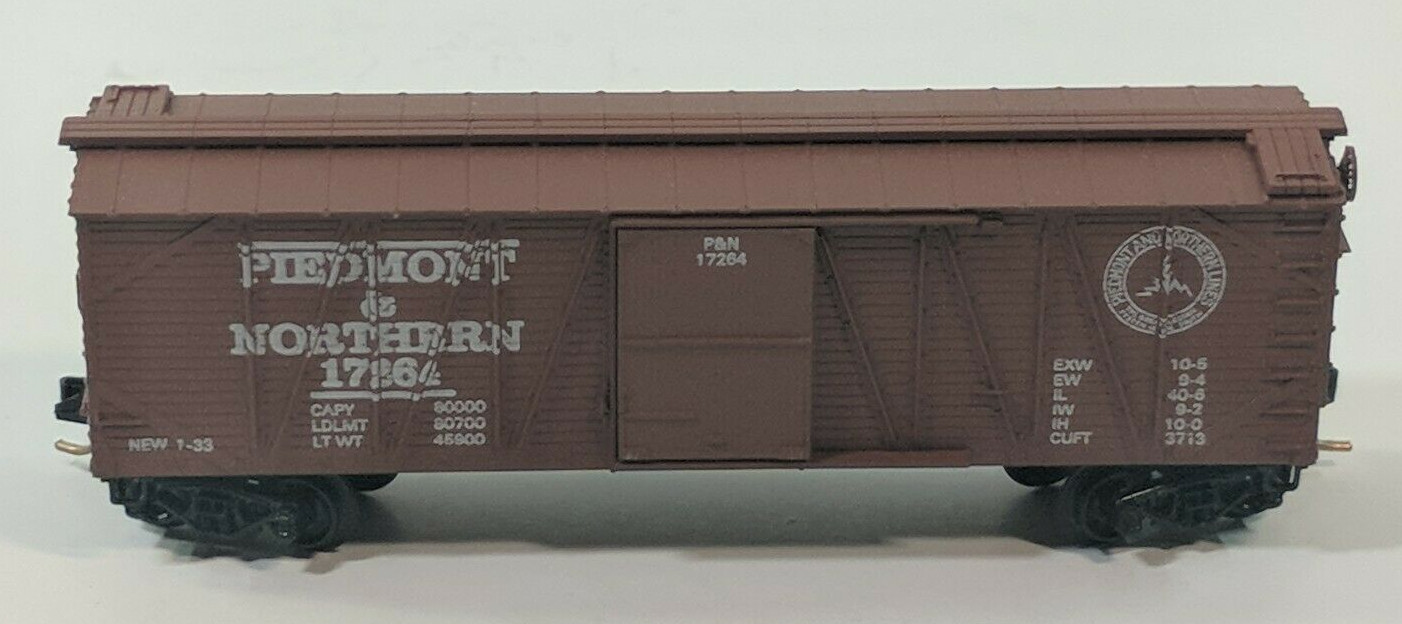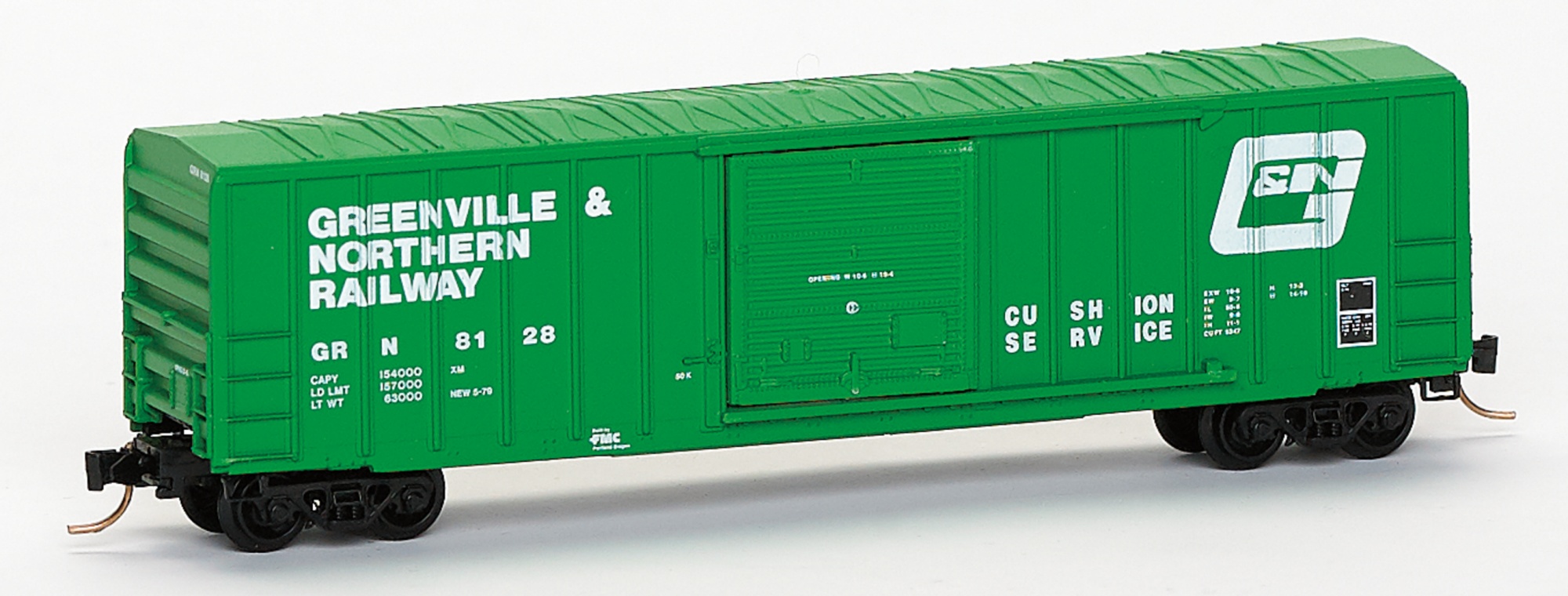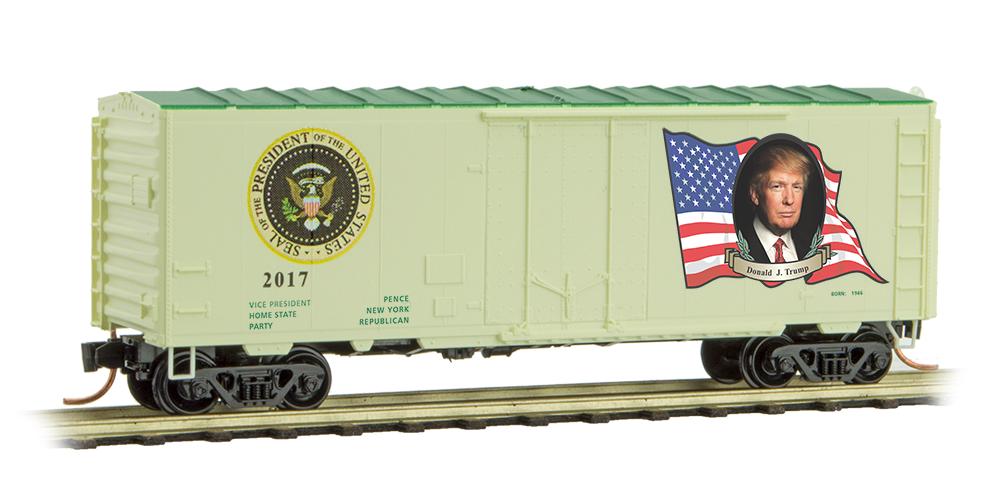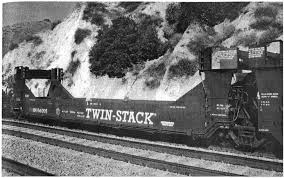Specific Item Information: 5-Unit articulated well car. No containers. 15050M-B is the MTL coupler version.
Model Information: This product from Deluxe Innovations features 5-unit articulated double-stack well cars for container transportation. Note the distinctive bulkhead ends of these cars.
Prototype History: A well car, also known as a double-stack car or stack car (also well wagon), is a type of railroad car specially designed to carry intermodal containers (shipping containers) used in intermodal freight transport. The "well" is a depressed section which sits close to the rails between the wheel trucks of the car, allowing a container to be carried lower than on a traditional flatcar. This makes it possible to carry a stack of two containers per unit on railway lines (double-stack rail transport) wherever the loading gauge assures sufficient clearance. The top container is secured to the bottom container either by a bulkhead built into the car (e.g., bottom and top containers are the same dimensions of 40 ft.), or through the use of inter-box connectors (IBC). Four IBCs are needed per wellcar. In the process of an inbound train becoming an outbound train, there are four processes: unlock to unload the top container of inbound train, remove then unload bottom container, insert after loading bottom container of outbound train, lock after top container loaded.
Double-stack container trains first hit the rails for regular service in 1981. The Southern Pacific Railroad had developed the idea to provide service for the Sea- Land maritime shipping company. SP's pioneering double-stack service let Sea- Land's containers take a shortcut from the west coast to the Gulf of Mexico bypassing the Panama Canal. From prototype car to production order, the SP spent a little over four years on the double-stack development project. The SP's double-stack cars featured unwieldy bulkheads on each end to prevent the loose top container from blowing off of the car.
The support for the upper container came from inter-box connectors (IBCs) which had been used for years in oceangoing container shipping.
The Twin-Stack was the first entry of Gunderson into the well-car market. It was introduced in 1985. The car had 40-foot wells and can carry 45-foot container in the top end positions, but only 40-foot containers in the intermediate positions. Gunderson updated the design by removing the bulkheads to create the Maxi-Stack (later renamed Maxi-Stack I).
Double-stack container trains first hit the rails for regular service in 1981. The Southern Pacific Railroad had developed the idea to provide service for the Sea- Land maritime shipping company. SP's pioneering double-stack service let Sea- Land's containers take a shortcut from the west coast to the Gulf of Mexico bypassing the Panama Canal. From prototype car to production order, the SP spent a little over four years on the double-stack development project. The SP's double-stack cars featured unwieldy bulkheads on each end to prevent the loose top container from blowing off of the car.
The support for the upper container came from inter-box connectors (IBCs) which had been used for years in oceangoing container shipping.
The Twin-Stack was the first entry of Gunderson into the well-car market. It was introduced in 1985. The car had 40-foot wells and can carry 45-foot container in the top end positions, but only 40-foot containers in the intermediate positions. Gunderson updated the design by removing the bulkheads to create the Maxi-Stack (later renamed Maxi-Stack I).
Road Name History: TTX Company (formerly Trailer Train until 1991) is a leading provider of railcars and related freight car management services to the North American rail industry. TTX's pool of railcars (over 220,000 cars and intermodal wells) is ideal for supporting shippers in the intermodal, automotive, paper & forest, metals, machinery, wind energy and other markets where flatcars, boxcars and gondolas are required.
Owned by North America's leading railroads, TTX's free-running pools provide fungible assets that minimize total empty miles, further lowering costs and minimizing risk for the industry, helping the railroads conserve their capital for other critical infrastructure needs. Customers easily recognize TTX's bright yellow cars as a consistent, high quality, well-maintained fleet that serves many transportation needs.
Owned by North America's leading railroads, TTX's free-running pools provide fungible assets that minimize total empty miles, further lowering costs and minimizing risk for the industry, helping the railroads conserve their capital for other critical infrastructure needs. Customers easily recognize TTX's bright yellow cars as a consistent, high quality, well-maintained fleet that serves many transportation needs.
Brand/Importer Information: DeLuxe Innovations is a "wholesale manufacturer" of model trains. We manufacture scale replica train models and sell them to hobby shops and distributors worldwide. 2013 marked the 20 year anniversary of DeLuxe Innovations brand trains. There are over 25 body styles in our product line and all of the cars in our single and multi-car packs have different road numbers. DeLuxe Innovations, Inc. is owned by Dave Ferrari, founder of Squeak N Products. We are located in Midland Park, New Jersey. When Dave purchased the business it was located in Burbank, California which would have been a bit of a long commute so the move to the East Coast was planned. Our first East Coast location was in Whippany, NJ along the Whippany River.
The business was started in 1993 by George Johnsen and Roberta Liebreich in Burbank, California. They had a philosophy that just wouldn't allow using a coal car as a "stand in" for a woodchip car, or printing any and all boxcar paint schemes on a PS-1. Starting with the release of the first ever etched metal parts for a ready to run car (1994's Twinstack's metal walkways) through the full dimension underframe and etched metal roofwalk (1996's 1944 AAR Boxcar) to the challenging RoadRailer system (2000), our products have been accurate to target the modeler or enthusiast.
You can also follow DeLuxe on Twitter
The business was started in 1993 by George Johnsen and Roberta Liebreich in Burbank, California. They had a philosophy that just wouldn't allow using a coal car as a "stand in" for a woodchip car, or printing any and all boxcar paint schemes on a PS-1. Starting with the release of the first ever etched metal parts for a ready to run car (1994's Twinstack's metal walkways) through the full dimension underframe and etched metal roofwalk (1996's 1944 AAR Boxcar) to the challenging RoadRailer system (2000), our products have been accurate to target the modeler or enthusiast.
You can also follow DeLuxe on Twitter
Item created by: Powderman on 2018-01-18 09:56:33. Last edited by gdm on 2021-03-02 11:29:29
If you see errors or missing data in this entry, please feel free to log in and edit it. Anyone with a Gmail account can log in instantly.
If you see errors or missing data in this entry, please feel free to log in and edit it. Anyone with a Gmail account can log in instantly.











